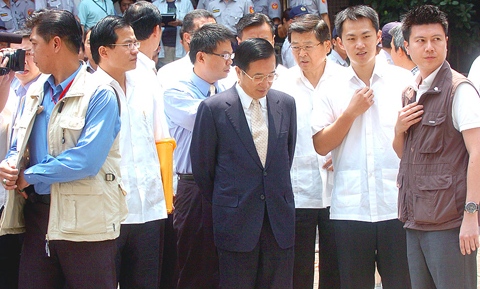The verdict in the slander suit against former president Chen Shui-bian (陳水扁) by retired Vice Admiral Lei Hsueh-ming (雷學明) will be handed down on Sept. 9, after the last hearing at the Taipei District Court yesterday.
“I did nothing wrong because I never named anyone when making the accusation,” Chen said at the hearing.
The case was filed in late 2005 after Chen, speaking on a TV talk show, accused “five retired Navy officers” of accepting kickbacks to produce false performance data on Lafayette frigates and inflate the price of the vessels to influence the Navy’s 1990 purchase of frigates from France, rather than from South Korea as planned.

PHOTO: LO PEI-DER, TAIPEI TIMES
Democratic Progressive Party legislators Hsu Kuo-yung (徐國勇) and William Lai (賴清德) repeated the accusations at a press conference.
Led by Lei, the retired officers — including two admirals, two captains and one commander — filed the suit against Chen, Hsu and Lai, asking for compensation of NT$2.01 billion (US$67 million).
The three defendants said they had only “speculated” that “five retired Navy officers” had taken bribes, but did not name names.
“We simply made reasonable speculation on the case, so it is not slander,” Chen said.
Hsu and Lai said they should have lawmakers’ immunity as they had made their accusation during a press conference at the legislature.
Lei told judges that the speculation was ridiculous.
“It was former president Lee Teng-hui (李登輝) who decided to buy the Lafayette frigates, not me. Also, I had been retired for more than two years when former Navy Captain Yin Ching-feng (尹清楓) was killed, so I had nothing to do with this,” Lei said. “Since the defendants could not provide sufficient evidence to prove their speculation, that is slander.”
Yin was head of the Navy’s Arms Acquisition Office. His body was found floating in the sea off the east coast of Taiwan on Dec. 9, 1993. Yin is believed to have been about to blow the whistle on colleagues taking kickbacks. His death prompted an investigation into irregularities surrounding the purchase of the frigates from France.

Trips for more than 100,000 international and domestic air travelers could be disrupted as China launches a military exercise around Taiwan today, Taiwan’s Civil Aviation Administration (CAA) said yesterday. The exercise could affect nearly 900 flights scheduled to enter the Taipei Flight Information Region (FIR) during the exercise window, it added. A notice issued by the Chinese Civil Aviation Administration showed there would be seven temporary zones around the Taiwan Strait which would be used for live-fire exercises, lasting from 8am to 6pm today. All aircraft are prohibited from entering during exercise, it says. Taipei FIR has 14 international air routes and

The Ministry of National Defense (MND) today released images of the military tracking China’s People's Liberation Army (PLA) movements during the latest round of Chinese drills around Taiwan. The PLA began "Justice Mission 2025" drills today, carrying out live-fire drills, simulated strikes on land and maritime targets, and exercises to blockade the nation's main ports. The exercises are to continue tomorrow, with the PLA announcing sea and air space restrictions for five zones around Taiwan for 10 hours starting from 8:30am. The ministry today released images showing a Chinese J-16 fighter jet tracked by a F-16V Block 20 jet and the

Snow fell on Yushan (Jade Mountain, 玉山) yesterday morning as a continental cold air mass sent temperatures below freezing on Taiwan’s tallest peak, the Central Weather Administration (CWA) said. Snowflakes were seen on Yushan’s north peak from 6:28am to 6:38am, but they did not fully cover the ground and no accumulation was recorded, the CWA said. As of 7:42am, the lowest temperature recorded across Taiwan was minus-5.5°C at Yushan’s Fengkou observatory and minus-4.7°C at the Yushan observatory, CWA data showed. On Hehuanshan (合歡山) in Nantou County, a low of 1.3°C was recorded at 6:39pm, when ice pellets fell at Songsyue Lodge (松雪樓), a

City buses in Taipei and New Taipei City, as well as the Taipei MRT, would on Saturday begin accepting QR code payments from five electronic payment providers, the Taipei Department of Transportation said yesterday. The new option would allow passengers to use the “transportation QR code” feature from EasyWallet, iPass Money, iCash Pay, Jkopay or PXPay Plus. Passengers should open their preferred electronic payment app, select the “transportation code” — not the regular payment code — unlock it, and scan the code at ticket readers or gates, General Planning Division Director-General Liu Kuo-chu (劉國著) said. People should move through the